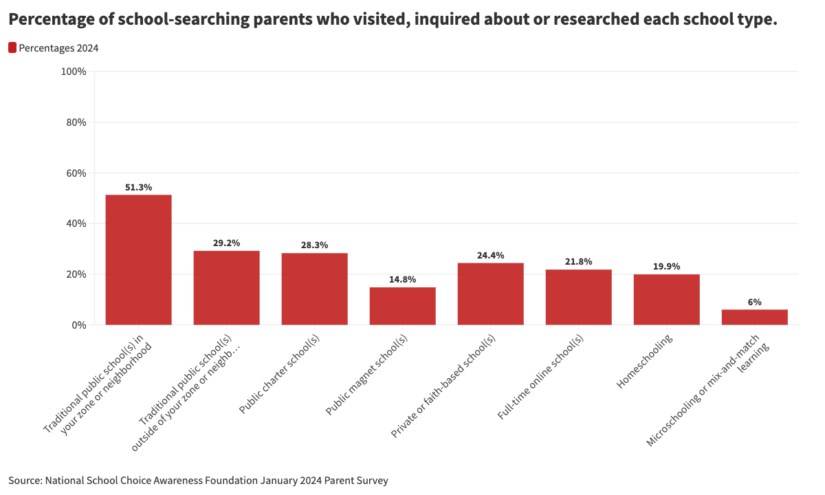During this summer, a team of students from MIT embarked on a journey to the sou …
New Survey Shows an Increasing Number of Parents Seeking to Change Their Children’s Schools
Jennifer Livingstone

A recent survey released this month indicates that parents are increasingly considering different schooling options for their children. Although a smaller number of families ultimately selected new schools, a majority expressed a desire for more information about school choice.
According to the survey, both local and out-of-district traditional public schools remain popular among families searching for schools. Charter schools, private and religious schools, as well as homeschooling, also ranked high among their choices.
The survey was conducted by The National School Choice Awareness Foundation and the National School Choice Resource Center (Navigate), in partnership with National School Choice Week. It included 2,595 parents of school-aged children.
The survey was conducted right after the onset of COVID-19 to gauge the impact of the pandemic on parents’ attitudes towards school choice and to offer support in navigating their options.
Andrew Campanella, CEO of the foundation, emphasized that families want options for their children. However, their perspective on choice differs significantly from that of policymakers.
According to the survey, about 75% of parents had considered new schools for their children, marking a 35% increase compared to the previous year. Around 44% of parents eventually chose a new school, while close to two-thirds expressed a need for more information about their options.

These survey results coincided with the start of National School Choice Week and shed light on a significant enrollment decline of over 1 million students in public schools nationwide. The decline reflects a growing disengagement from public schools.
According to the National School Choice Awareness Foundation, school choice empowers parents to select the most suitable schools and learning environments for their children, including options like traditional public schools, charter schools, and private schools.
The foundation does not engage in policy advocacy and doesn’t favor any particular schooling option. The CEO, Andrew Campanella, has previous experience at the American Federation for Children, a school choice advocacy group.
Parents have various reasons for exploring new schools, such as dissatisfaction with local public schools not providing sufficient accelerated curriculum or limited resources for students with disabilities. Some families also look for schools that align with their values and belief systems.

Advocates point to Republican-led states adopting or expanding school choice policies, which they view as diverting funds from public schools. Alongside this, conflicts over remote learning, mask mandates, and classroom content have contributed to criticism of public schools and teachers.
The survey highlighted that traditional public schools remain popular among families considering new schools. Over half of parents reported visiting, inquiring, or researching local public schools, while nearly 30% did the same for public schools outside their neighborhoods. The numbers were slightly lower for charter schools, private or faith-based schools, homeschooling, and full-time online schools.
In contrast to the partisan framing of school choice, the National School Choice Awareness Foundation highlighted the non-partisan nature of parents’ choices. According to the survey, Democrat parents chose new schools for their children at higher rates (56%) compared to Republican parents (40%).
Another poll conducted by Education Next revealed that support for school choice was starkly partisan, wherein 60% of Republicans had a favorable position compared to 41% of Democrats. The phrasing of questions in surveys conducted by advocacy groups impacts the results, leading to different perceptions.

The survey by the National School Choice Awareness Foundation did not specifically inquire about vouchers. The focus was on types of schools rather than the mechanisms utilized to access them. The results of the survey aided in planning the events supported by the foundation for National School Choice Week.

